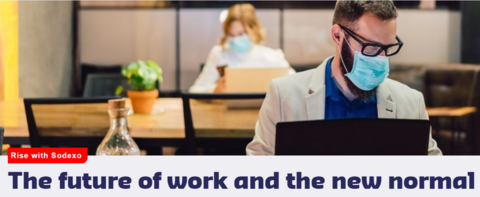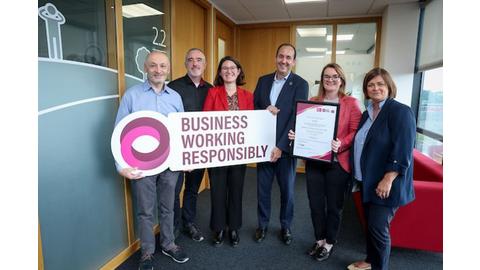COVID-19 • Members
Rise with Sodexo - The future of work and the new normal

Julie Ennis, CEO of Corporate Services at Sodexo UK and Ireland, explores five trends that will shape workplaces in a post-pandemic world.
The world has changed beyond belief in the past few months, impacting all aspects of our work and our lives. 
As our thoughts now turn to the future of work, Sodexo’s mission to improve quality of life is more relevant than ever. Workplaces, wherever they may now be, need to be safer and healthier, with renewed focus on the link between wellbeing and productivity.
We recently launched rise with Sodexo, a unique programme tailored to the needs of every client as they reopen and prepare for the post-pandemic reality. Businesses are drawing on our expertise to prioritise their people, implement supportive changes and seize opportunities.
Many organisations appear to have communicated well throughout the pandemic. Research from Harris Interactive shows that 70% of employees are confident in their employers’ ability to manage the transition back to work.
What this transition will look like remains to be seen, but trends are already emerging from our conversations with clients and we’re seeing new expectations for everything from office space and how it is managed to food and support for remote working.
The trends shaping the future
The Covid-19 crisis has brought cleanliness and hygiene into much sharper focus. Previously unknown terms such as ‘social distancing’ are now part of everyday language and the habits they describe have become second nature.
People are more reliant on technology and many have had to become more flexible. Some of these changes are sure to remain after the pandemic, contributing to a significant shift in the long-term future of work.
66% of employees expect greater focus on hygiene in the workplace
44% expect more use of remote collaboration and meeting tools
As the world starts moving again and we consider the implications of that shift, we are beginning to understand how the emerging trends will affect each of the five key areas that represent Sodexo’s Vital Spaces ecosystem of workplace experience.

1) Changes in Workplace Strategy
With the majority of the workforce having no option but to work exclusively from home for an extended period, new habits have formed. Physical office space will be adapted so it can foster collaboration in new ways and remote working will be more common.
We believe the notion of travel and commuting will be challenged in terms of time, productivity and sustainability. Teams will be more distributed and self-discipline will be key to accomplishing tasks outside of traditional work environments.
Covid-19 has changed everything, shining a light on the importance of wellbeing. Employers need to take a more holistic approach and look at all aspects of the working environment.
So Young Hyun, Workplace Lead, Wx
According to Global Workplace Analytics, employers save $11,000 (£9,000) for every person who works from home half of the time. As we face the prospect of a lasting global recession, a more fluid workplace, with companies arranged across a ‘hub and satellite’ model, may help achieve much-needed cost savings.
Homes are already considered viable potential workplaces, and ‘third spaces’ such as co-working hubs and coffee shops will now gain greater recognition.
2) Changes in Workplace Design
As organisations come to understand how to facilitate physical distancing, the traditional workspace will take on a new purpose. It will need to protect health and wellbeing, as well as encourage collaboration between employees, clients and communities.
Every department, from real estate and facilities to HR and IT, will have to adapt and unite to meet the new needs of employees.
57% of employees feel enthusiastic or relieved about returning to their normal place of work.
Demand for segregated areas is likely to increase as people become more conscious of the space they occupy with others, while screens and hygiene stations will become standard aspects of workplace design. Face-to-face time will be more valuable as it becomes less frequent, so office design will need to safely maximise collaboration and interaction.
3) Changes in Workplace Management
Organisations such as Sodexo will need to be agile in response to changing workplace needs.
Food has always played an important role in bringing people together, but more limited human interaction means companies now need to look beyond the boundaries of the traditional workplace to encourage collaboration.
Cleanliness has overtaken taste as the number one concern for consumers when selecting a restaurant.
Datassential Covid-19 Report 3
Sustainability is also likely to come to the fore. Commuting will decline as people work from different places, reducing the carbon footprint of work and renewing focus on green initiatives.
Cleaning and janitorial services, previously delivered outside traditional working hours, will become more visible to ensure peace of mind and support for employees and visitors.
4) Changes in Worklife Services
Employees now have an expectation that their employers will keep them safe, supporting their physical, mental and emotional health.
Businesses were already improving their approach to wellbeing and we work with many companies who have been making changes to put people first. The pandemic has proven it takes much more than the absence of illness for people to feel and perform at their best.
Employers will need to take a more holistic approach, helping protect employees from immediate health risks, achieve and maintain better physical and mental health, and drive towards optimum performance.
So Young Hyun, Workplace Lead at Wx
Employee behaviour is likely to change as maintaining good health is top of mind for many. Harris Interactive research shows 35% of people believe their mental health is worse than before the lockdown, so we expect there will be greater awareness of the risks of worry, loneliness and isolation.
We also expect support services at work and at home to become more prominent. From concierge services that remove daily distractions to childcare and home services that can help improve the work-life balance.
5) Changes in Workplace Analytics
All of these changes will combine to make employees more autonomous. Digital technology will be developed to enable this shift, with enhanced training and support to stay connected and productive.
Sensors will gather data on how spaces are used, whether physical distancing is maintained and environmental factors such as air quality and temperature. And we will work with employers to help them use this data to drive decisions on everything from the use of space to the potential introduction of automation technology and robotics.
As employees spend more time at home and the workplace starts to evolve into a place that supports collaboration, technology can be an enabler. Consumers will be looking for more digital solutions to access the services they need.
Adrian Evans, Food Transformation Director at Sodexo UK and Ireland
Creative solutions for the new normal
An understanding of the trends that will shape both the nature of the enterprise and the future of work allows us to plan ahead. But there is still much to learn about the new normal and the changes organisations will have to make.
At Sodexo, we are planning ways to adapt our own services in order to help our clients plan for the future. In unprecedented times, creative solutions, combined with agility and resilience, can help organisations survive and ultimately thrive again.
To find out more about how we can help you prepare your business for its new normal, please click here to contact us.
Source


